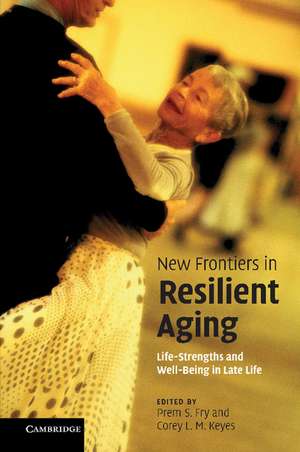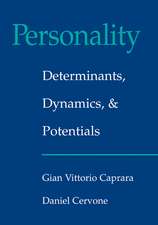New Frontiers in Resilient Aging: Life-Strengths and Well-Being in Late Life
Editat de Prem S. Fry, Corey L. M. Keyes PhDen Limba Engleză Paperback – 2 ian 2013
| Toate formatele și edițiile | Preț | Express |
|---|---|---|
| Paperback (1) | 378.36 lei 6-8 săpt. | |
| Cambridge University Press – 2 ian 2013 | 378.36 lei 6-8 săpt. | |
| Hardback (1) | 534.91 lei 6-8 săpt. | |
| Cambridge University Press – 28 iul 2010 | 534.91 lei 6-8 săpt. |
Preț: 378.36 lei
Nou
Puncte Express: 568
Preț estimativ în valută:
72.40€ • 75.59$ • 59.92£
72.40€ • 75.59$ • 59.92£
Carte tipărită la comandă
Livrare economică 04-18 aprilie
Preluare comenzi: 021 569.72.76
Specificații
ISBN-13: 9781107412491
ISBN-10: 1107412498
Pagini: 388
Ilustrații: Illustrations
Dimensiuni: 152 x 229 x 20 mm
Greutate: 0.52 kg
Editura: Cambridge University Press
Colecția Cambridge University Press
Locul publicării:New York, United States
ISBN-10: 1107412498
Pagini: 388
Ilustrații: Illustrations
Dimensiuni: 152 x 229 x 20 mm
Greutate: 0.52 kg
Editura: Cambridge University Press
Colecția Cambridge University Press
Locul publicării:New York, United States
Cuprins
Foreword John W. Rowe; Introduction; 1. Sources of human life strengths, resilience and health Prem S. Fry and Dominique L. Debats; 2. Growth isn't just for the young: growth narratives, eudaimonic resilience, and the aging self Jack J. Bauer and Sun W. Park; 3. Physical resilience and aging: correcting the Tithonus error and the crème brulée error Aubrey D. N. J. de Grey; 4. You can teach an old dog new tricks: harnessing neuroplasticity after brain injury in older adults Gitendra Uswatte and Edward Taub; 5. Resilience in the face of cognitive aging: experience, adaptation, and compensation Christopher Hertzog and Daniela S. Jopp; 6. Why do some people thrive while others succumb to disease and stagnation? Personality, social relations, and resilience Margaret L. Kern and Howard S. Friedman; 7. Psychosocial resources as predictors of resilience and healthy longevity of older widows Prem S. Fry and Dominique L. Debats; 8. Resilience and longevity: expert survivorship of centenarians Peter Martin, Maurice MacDonald, Jennifer Margrett and Leonard W. Poon; 9. The socioemotional basis of resilience in later life Anthony D. Ong and Cindy S. Bergeman; 10. Emotional resilience and beyond: a synthesis of findings from lifespan psychology and psychopathology Eva-Marie Kessler and Ursula M. Staudinger; 11. Risk, resilience, and life-course fit: older couples' encores following job loss Phyllis Moen, Stephen Sweet and Rachelle Hill; 12. Resilience in mobility in the context of chronic disease and aging: cross-sectional and prospective findings from the UAB study of aging Patricia S. Sawyer and Richard M. Allman; 13. Positive aging: resilience and reconstruction Kenneth J. Gergen and Mary Gergen.
Recenzii
'Resilience is not just for the young. Indeed, the challenges of getting older present many opportunities for developing resilience and bouncing back stronger than before. The authors of this fine volume show us, in many different ways, that old age need not be a relentless downward slide. Growing old (with the emphasis on growing) can be exciting, creative and fun!' Rob Ranzijn, University of South Australia
'This book will be cited far and wide as reflecting a turning point in how to view aging from progressive, enlightened ways, all supported by excellent scholarship. It will be invaluable for a wide audience that includes scientists who study aging, educators, administrators, practitioners and those drafting well informed social policy.' David Reid, York University, Toronto
'This is an important book on an important topic, at just the right time. Resilience, the ability to recover after stressful life events, has been long studied among children but neglected by gerontologists. Now we have a summary of what has already been done and an invitation to do more.' Robert L. Kahn, University of Michigan
'This extremely comprehensive literature review elaborates a well established concept and puts it into a completely new light. A must buy book for all who are convinced that resilience and human strengths are the key to productive and equitable aging societies.' Christoph Rott, Heidelberg University
'We recommend New Frontiers in Resilient Aging for those interested in issues related to policy analysis and medical and social work practice in later adulthood as well as to those interested more generally in adult and/or life-span development … this volume provides a valid and impressive foray into relatively uncharted territory, namely, resilience in later adulthood.' PsycCRITIQUES
'This book will be cited far and wide as reflecting a turning point in how to view aging from progressive, enlightened ways, all supported by excellent scholarship. It will be invaluable for a wide audience that includes scientists who study aging, educators, administrators, practitioners and those drafting well informed social policy.' David Reid, York University, Toronto
'This is an important book on an important topic, at just the right time. Resilience, the ability to recover after stressful life events, has been long studied among children but neglected by gerontologists. Now we have a summary of what has already been done and an invitation to do more.' Robert L. Kahn, University of Michigan
'This extremely comprehensive literature review elaborates a well established concept and puts it into a completely new light. A must buy book for all who are convinced that resilience and human strengths are the key to productive and equitable aging societies.' Christoph Rott, Heidelberg University
'We recommend New Frontiers in Resilient Aging for those interested in issues related to policy analysis and medical and social work practice in later adulthood as well as to those interested more generally in adult and/or life-span development … this volume provides a valid and impressive foray into relatively uncharted territory, namely, resilience in later adulthood.' PsycCRITIQUES
Descriere
This volume looks at human aging from a positive perspective, examining how older adults can exploit psychological strengths to enhance life satisfaction.







